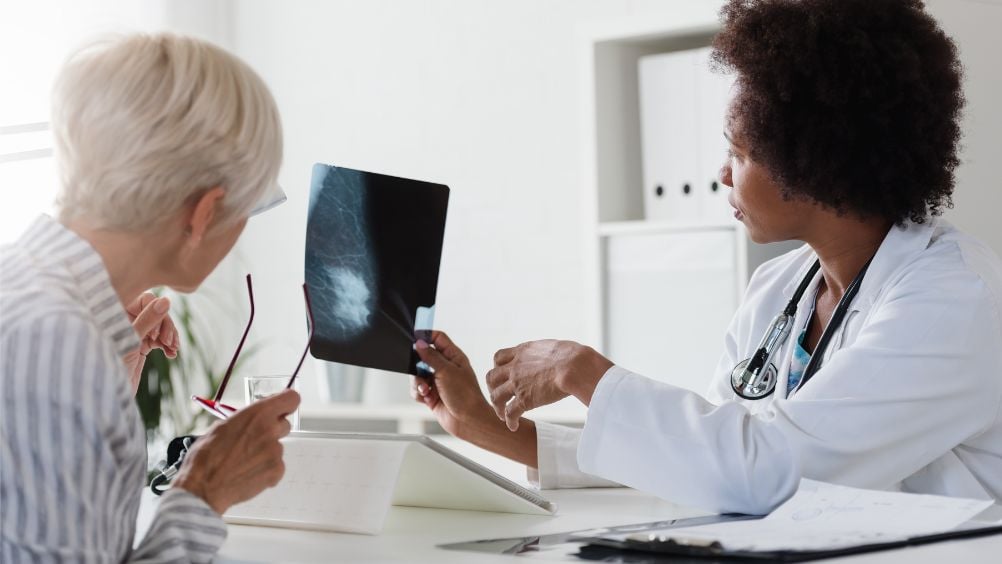You may notice that there is a lot of information out there about breast cancer. While information can be helpful, it's important to know what is fact and what is fiction.
Understanding Breast Cancer
When breast cancer is caught early, the five-year survival rate is 99%, according to the American Cancer Society. But breast cancer is not just one specific disease; it’s many different diseases, so it requires individualized breast cancer treatment.
“About 1 in 9 women will have breast cancer affect their life in some way,” says Willamette Valley Cancer Institute medical oncologist Dr. Keith Wells. “Each individual’s breast cancer is different, and it affects them in different ways. Where the breast cancer is located, where it has spread, how big it is—all that plays a role in the different treatment options available.”
Breast cancer is often treated with surgery, as well as chemotherapy, radiation, hormone therapy, or a combination of those treatments.
“When breast cancers are evaluated in the pathology lab, certain stains are added to them to look for the estrogen receptor and the progesterone receptor, as well as a receptor called HER2,” says Dr. Wells. “How a patient’s breast cancer expresses those proteins determines which treatment we can offer them.”
Learn more about hormone receptor status in breast cancer and how it impacts treatment.
Researchers are consistently working to find better ways to prevent, detect and treat breast cancer and to improve the quality of life of patients and survivors.
Related reading: Understanding Breast Cancer Molecular Subtyping and Its Importance
Watch the video below to learn more about how advancing technology is helping breast cancer doctors, like Dr. Keith Wells create personalized breast cancer treatment plans. Hear breast cancer survivor Stacia's inspiring journey to recovery.
Separating Fact From Myth
When it comes to breast cancer, there are a lot of mistruths. Does wearing deodorant or an underwire bra cause breast cancer? Could using a cell phone increase your risk of getting the disease? If you have a family history of the disease, does that mean you’re sure to be diagnosed, too? With all the information swirling online, it can be difficult to tell the difference between what is true and false.
Misinformation can influence whether or not you get breast cancer screenings or even talk to your doctor about certain symptoms. For the good of your health, it's important that we talk about some of the most common myths and the truth about breast cancer.
Common Breast Cancer Myths
11 common myths about breast cancer include:
- You have to have a family history.
- Mammograms will spread cancer.
- Wearing a bra (or underwire) causes cancer.
- Deodorant causes breast cancer.
- Maintaining a healthy lifestyle means you won't develop breast cancer.
- Breast cancer is always a lump you can feel.
- Carrying your cell phone in your bra causes cancer.
- If you carry the BRCA gene, you will get breast cancer.
- Only women get breast cancer.
- Breast cancer has become an epidemic in younger women.
- Silicone breast implants increase your risk of breast cancer.
Myth 1: You have to have a family history.
So often, people assume that you must have a family history to be worried about a breast cancer diagnosis. This simply is not true. In fact, most women diagnosed with breast cancer have no family history of the disease. It's important to schedule your regular mammogram screenings even if nobody in your family has ever been diagnosed with breast cancer.
Myth 2: Mammograms will spread cancer.
Mammograms are used to detect breast cancer, not spread cancer. Along these same lines, women sometimes assume that the radiation levels from mammograms are harmful. However, the advances in mammogram technology have greatly reduced radiation levels, so it is a safe procedure.
Read our blog: Detecting Breast Cancer Early with 3-D Mammograms
Myth 3: Wearing a bra (or underwire) causes cancer.
There is absolutely no research that says that wearing a bra of any kind, including an underwire, causes breast cancer or even increases your risk.
Myth 4: Deodorant causes breast cancer.
There is no supporting research that proves that deodorant causes breast cancer or increases your risk of developing it.
Myth 5: Maintaining a healthy lifestyle means you won't develop breast cancer.
While healthy habits can lower your risk, they don’t eliminate it. Many women diagnosed with breast cancer struggle to understand why it happened despite their healthy lifestyle. The truth is, no lifestyle choice guarantees you’ll never get breast cancer. Even those who do everything "right" can still be diagnosed.
Most breast cancers are caused by factors outside of our control. It’s important to manage the risk factors you can control, but regular screenings and staying aware of changes in your breasts are just as crucial.
Myth 6: Breast cancer is always a lump you can feel.
A lump is one of the most common symptoms of breast cancer, but not all forms of breast cancer have a lump you can feel. For example, inflammatory breast cancer usually doesn't have a lump and may also be difficult to detect with a mammogram.
Myth 7: Carrying your cell phone in your bra causes cancer.
This is another myth that you may be tempted to believe. There is no research that supports that carrying your cell phone in your bra causes cancer or increases your risk of cancer.
Myth 8: If you carry the BRCA gene, you will get breast cancer.
Carrying the BRCA gene doesn't guarantee you will get breast cancer, but it can increase your risk. Women who test positive for the BRCA-1 or BRCA-2 gene have a 45-65% chance of developing breast cancer before the age of 70. Learn about the genetics of breast cancer.
Myth 9: Only women get breast cancer.
While breast cancer is more common in women, men can also get breast cancer. Men have breast tissue, so therefore cancer can develop there. However, breast cancer in men is rare, with only 1% of breast cancer diagnoses being men.
Myth 10: Breast cancer has become an epidemic in younger women.
Any woman can be at risk of developing breast cancer. However, breast cancer mainly occurs in middle-aged and older women. The median age at the time of breast cancer diagnosis is 62. Half of those who develop breast cancer are age 62 or younger when they are diagnosed, and a small number of women diagnosed are younger than 45.
Myth 11: Silicone breast implants increase your risk of breast cancer.
While it's true that silicone breast implants may cause scarring on breast tissue, many studies have found that it does not increase your risk of developing breast cancer.
Get Your Mammogram
There is a lot of misinformation buzzing around about breast cancer, but Dr. Wells says women and men can take charge of their health by performing routine breast self-exams and reporting anything abnormal to their doctor.
Talk with your health care provider about when you should begin routine mammograms. You may be advised to start screenings sooner if you have a family history of the disease.
However, the best thing you can do for your health is to make sure you're getting regular mammogram screenings. Doing so will help with early detection.
“If we detect a breast cancer early, we can treat it better,” Dr. Wells says.
If you're uninsured, check out the Oregon Health Authority website for more information on how to get your mammogram for an affordable price.
Originally published May 2018. Updated February 2025.




